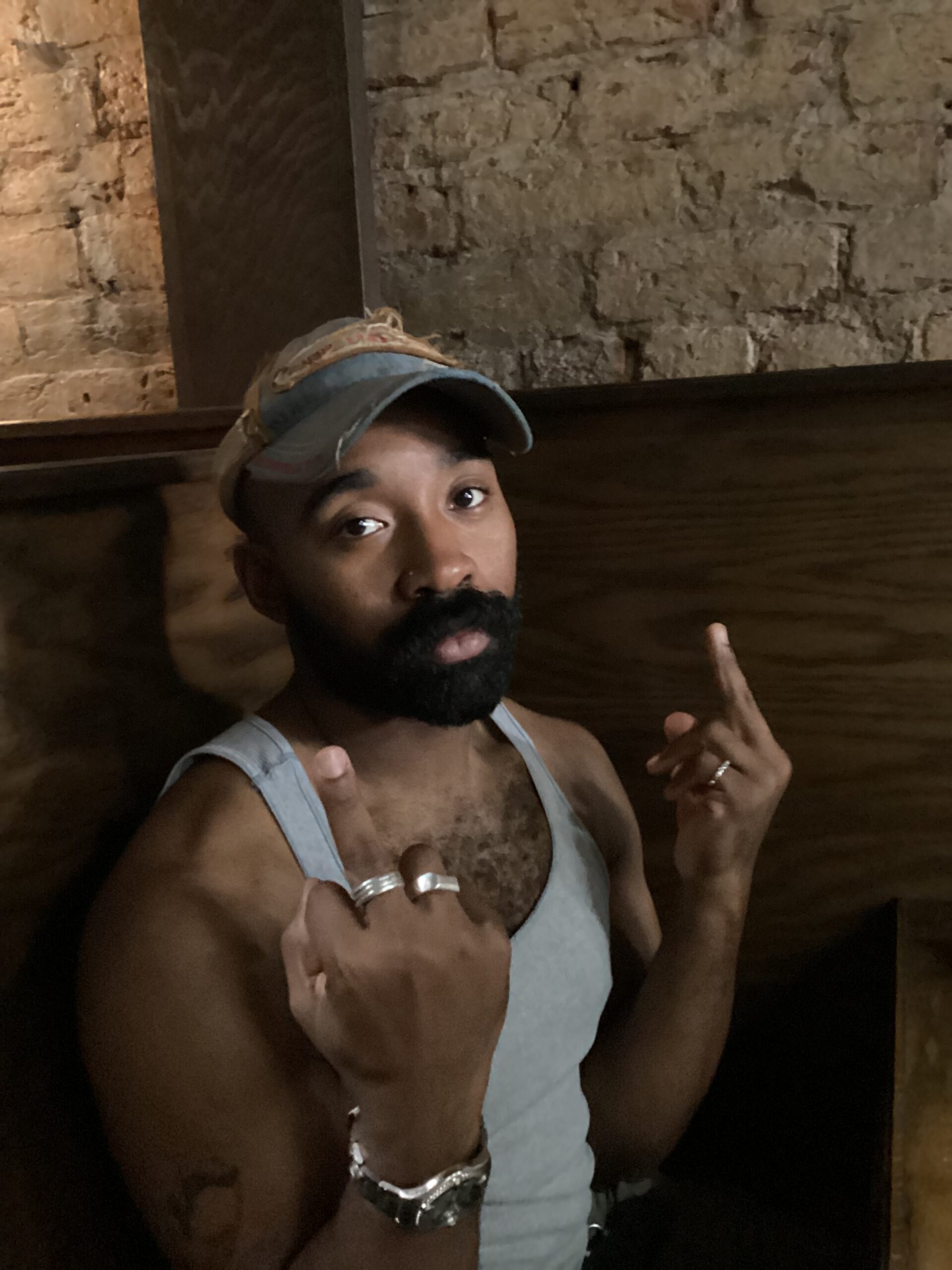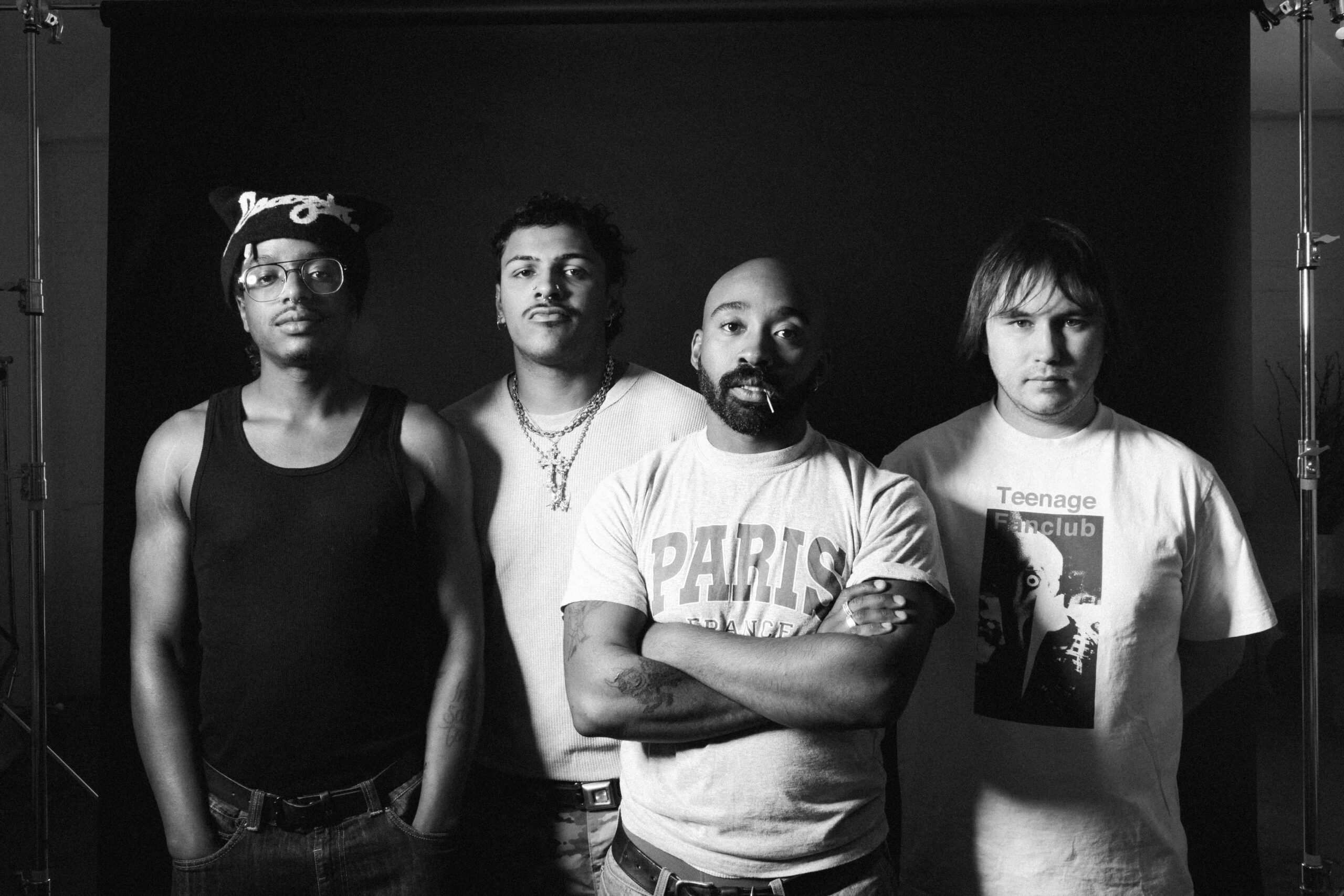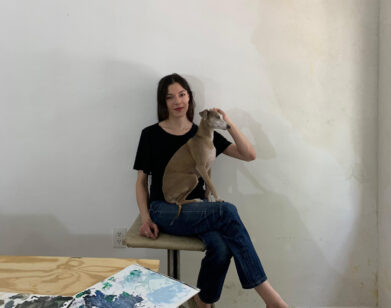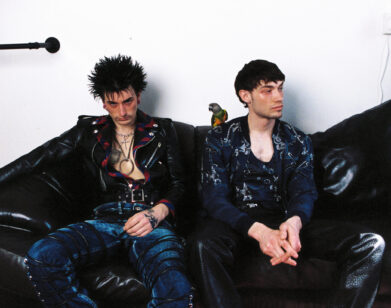DROP
“We’re Like the Black Bruce Springsteen”: The Boys of Enumclaw Have Something to Say
Enumclaw once described themselves as the best band since Oasis. But now that Oasis miraculously plans to reunite next summer, perhaps we might call Enumclaw the best band since, well, Enumclaw. Hailing from Tacoma, Washington, the four-piece indie rockers—composed of frontman Aramis Johnson, guitarist Nathan Cornell, bassist (and Johnson’s brother) Eli Edwards, and drummer LaDaniel Gipson—found themselves enmeshed yet isolated in the Pacific Northwest’s rich musical lineage. They had been a band for just a year when their debut album, Save The Baby, was released. But as much as they were part of the PNW’s greater artistic tapestry, they felt siloed as a new band without a defined local scene.
Home in Another Life, the group’s second album (and first for revered indie label Run For Cover), feels like their actual debut, as Johnson told me over Zoom last month. It’s rife with all of the key Enumclaw signifiers, such as fuzzy guitars, melodic earworms, plus some more autobiographical details by way of the heartfelt, straightforward lyrics such as those about Uncle Mike’s early-onset Alzheimer’s in “Not Just Yet.” With or without a discernible “scene,” Enumclaw seems right at home. Before the record’s release this Friday, Johnson sat down with me to discuss the band’s new label, how they’ve grown since their 2022 debut, and his recent move to Los Angeles.
———
GRANT SHARPLES: What’s up, Aramis?
ARAMIS JOHNSON: Not a whole lot.
SHARPLES: Are you still in Tacoma?
JOHNSON: No, I moved to L.A.
SHARPLES: I remember last time we talked, you were thinking about moving.
JOHNSON: Yeah. I’m homesick, but I also really don’t want to go back to Tacoma right now.
SHARPLES: Well, congrats on the new record. I’ve been really digging listening to it this past week. How does it feel putting it out soon?
JOHNSON: It feels good. I mean, we finished writing it like a year ago. I wrote the last song right when we got back from our European tour, and then we recorded it in November, and it’s been done since then. I was reading the interview you did with Nate [Amos] from Water from Your Eyes.
SHARPLES: Oh, yeah?
JOHNSON: He was talking about how he can’t really move on and make new stuff until the other stuff is out. And that’s kind of how I feel: I’m just excited to let it go into the world and start on the next thing.
SHARPLES: To you, it’s old at this point.
JOHNSON: But it’s exciting. When you put music out, it does bring a new energy to it, you know?
SHARPLES: Exactly. So when did you start writing it?
JOHNSON: I came home from the studio one night and wrote “I Still Feel Bad About Masturbation,” maybe while we were recording Save The Baby. And there’s already new songs that we wrote in November right after we recorded the album, probably four or five floating around. But to go back to your original question, it’s been like two years—from December of 2021 to June of 2023.
SHARPLES: Oh, so it was a pretty long gestation process.
JOHNSON: Yeah. It was really hard to write this record. Because, during COVID, I didn’t have any responsibilities. It was this lawless era where I could wake up and ride my bike for two hours every day and write songs all day. And then we started touring, and then I had to get a part-time job, and all the things that are life came back.
SHARPLES: But it sounds like you just dove right back into writing music again.
JOHNSON: Yeah, I was very excited about it at that point.
SHARPLES: So this is your first album under [the label] Run for Cover. How did that come about?
JOHNSON: We met them two years ago at South by Southwest. And my favorite band is this band Narrowhead, who’s signed with Run for Cover. Very quickly, they just made the most sense. They’re the most player-turned-coach label, and not on some industry millennial shit. I really like all those guys as people first. And I think they have the best batting average of any indie label.
SHARPLES: Yeah, they have such a stacked roster. Now, you guys are part of that too. But the thing with Run For Cover is, I feel like it’s such a big hardcore and emo label. What does it feel like to be a non-hardcore, non-emo band and become part of that universe?
JOHNSON: It’s definitely something we’ve talked about amongst the band. But I think for a while now, they’ve kind of been pivoting toward signing bands that are more in line with us. For some reason, a lot of hardcore bands like ours. So it makes sense culturally, even though it doesn’t sonically agree. Some of the first shows I started going to were hardcore shows.
SHARPLES: In the two years since Save The Baby, do you feel like you guys have grown as a band?
JOHNSON: We talked about this a lot on the last tour we just went on, but Save The Baby came out a year after we became a band. None of us had ever been in bands before, and we were in the van on tour listening to all these demos and realized that, as a band, we got better so fast. I didn’t really feel like we knew how to be a band until, I don’t know, the last eight months. Everybody’s ego has been humbled in a really important and nice way. This is such a cliche, and I hate a cliche, but this feels like our first record. Like, I know the music is good and I feel proud of these songs. All of the metrics don’t matter to me as much as they did when we put out Save The Baby. I feel very at ease with the pace of everything.
SHARPLES: Yeah, because it seemed like, at first, everything was happening for you guys really quickly. Now, you’ve kind of found a nice pace at which to grow.
JOHNSON: I don’t know. At one point, it was, “Wow, we didn’t get that festival,” or “Oh my god, what does this mean?” I felt in times past, I was hitting the refresh button. But I don’t honestly care to know at this point. I just have a better understanding of the ebbs and flows of being in a band and trying to focus on the things that we can control. I feel like my desire is wrapped up in other things at this point.
SHARPLES: So, do you guys still consider yourselves the best band since Oasis?
JOHNSON: I mean, definitely. I think we’re in a new era, though. We’re more concerned with being a band for the people. No skinny white shit.
SHARPLES: So in a way, you’re the best band since Enumclaw?
JOHNSON: Yeah, I guess you could put it that way.
SHARPLES: So you worked with Toro y Moi on your last EP [These Are Some B-Sides], right?
JOHNSON: Yeah, that whole thing is super annoying to me. We befriended Chaz [Bear] kind of early on into the band. He reached out and asked us to help him with this song he was producing for Tanukichan. And since then, we’ve just been friends. He offered up his studio and resources in Berkeley, and we went there and tracked three songs that, more or less, were unfinished. And Luminelle kind of forced us to put them out, because they paid for our travel expenses to the Bay Area. So I don’t really like the tag. I feel like if we would’ve done the same thing and Chaz hadn’t been involved, we probably wouldn’t have put out the songs. But they were so into the idea of something being produced by Toro y Moi. In reality, it’s just this guy Chaz that helped us record some demos, which we then had to put out.
SHARPLES: Because your label at the time forced you to release them?
JOHNSON: Yeah. It felt very gamified to me in a way that doesn’t feel genuine to the band. There’s no extra pizazz to any of those songs.
SHARPLES: I bet you’re excited about being under a new label that won’t force you to put out what you considered to be demos.
JOHNSON: Yeah, but don’t get me wrong: I liked all the people at the label. But it felt like they were very into capitalizing on our relationships with other bands or artists. Just in terms of the quality, there’s such a stark drop-off with those three songs in comparison to everything else we’ve put out.
SHARPLES: Yeah. This new record, Home In Another Life. What does that title mean to you?
JOHNSON: I was in London, staying with this girl. Her roommate came home one day and was talking about this guy that she had a crush on and she said, “He’s like a home in another life.” And I had never heard that phrase or sentiment before. It stuck in my head for months and I couldn’t stop thinking about it. Just that feeling you have for certain people in your life, where it feels like you’ve known them forever. I felt like that was a great representation of what all these songs mean to me: they feel so much more vulnerable and lived in and honest than anything else we’ve done so far.
SHARPLES: Is the band your home in another life?
JOHNSON: Well, yeah. Being in this band has validated all of us as people. In the last three years, I’ve gotten introduced into this world, but there’s this understanding and knowingness amongst my friends and I in Tacoma. It’s like, “I’ve never met this person before, but I know you in the way that you know me.”
SHARPLES: I know you’re living in L.A. now, but do you still identify with the Pacific Northwest scene?
JOHNSON: I don’t think we were ever part of the scene there, and we’re still not really. We’re friends with some of the bands out there, and I do feel very rooted and connected to the Pacific Northwest. Being in LA for a year has really cemented that. I am 28 years old, and I feel very stuck in my ways. Sometimes I feel too working class to be here. I feel too blue collar for Los Angeles, and I think that’s a very Pacific Northwest sentiment. I went to see ‘Slauson Malone’ the other day, and it felt so self-indulgent and tired to me. It’s supposed to be this heady experience or performance. And I was Googling the artist, and this guy’s dad is like blue on Wikipedia.
SHARPLES: You were like, “Oh. Now, it makes sense.”
JOHNSON: Yeah. I grew up with kids whose parents– their mom was a teacher, and their dad worked at the City Power company, or something. Very middle of the road, middle class things. People out here’s parents are on the board of directors for Kellogg’s and shit.
SHARPLES: Yeah. So what do you feel like Home In Another Life says about Enumclaw as a band? What do you feel like its statement is?
JOHNSON: That we’re going to continue to do what we do. This feels very much like we are planting our flag in the ground in an “if you build it, they will come” way. For a long time, I felt insecure and frazzled by what was deemed to be normal and cool– this feels very earnest in a way I’m proud of.
SHARPLES: Do you have a song that you’re most excited about?
JOHNSON: My favorite song, I think, is “Sink.” I had such bad writers’ block, probably four or five months of no songs, before I wrote it. And I just love the sentiment behind it. But I’m excited for everybody to find the moments that they really enjoy on the record.
SHARPLES: Yeah, how do you overcome writer’s block?
JOHNSON: Just this week, I started to try to write some songs again. And for a long time, I used to get really frustrated in that process– which I felt like would enable more writer’s block. Now, I’ve kind of found peace with just continuing to play the guitar and realizing if a song is supposed to come, it’ll come. It always seems to come that way.
SHARPLES: Not trying to force it.
JOHNSON: Yeah. There’s not really any song on the record that I really felt like I labored over.
SHARPLES: The best things will come naturally.
JOHNSON: Yeah, you just have to be ready for them. I don’t know, I think the biggest thing for me is playing guitar every day again.
SHARPLES: Do you feel like the guitar parts come more naturally for you than the lyrics?
JOHNSON: Not necessarily. They’re so hand in hand for me because I’m not that good at the guitar. I do think I’m getting better. Yesterday, I came up with something really cool on the guitar, and usually that would mean a new song. I guess what I realized is that I don’t know what feels important enough to be heard. And my life has been very boring the last eight months.
SHARPLES: I also wanted to talk about the album cover. It reminded me of classic records like Born in the U.S.A. and Sticky Fingers.
JOHNSON: The funniest thing is it was actually an internal dilemma, the photo we went out to shoot.
SHARPLES: Oh, okay.
JOHNSON: We shot all the photos on the same farm where we shot the music video for “Change.” And the concept for the album art was supposed to be Huey, who is the star of the video, front and center with cows in the foreground. But after I saw the belt buckle photo, it felt so iconic that we couldn’t move past it. A joke we’ve been making recently is that we’re like the Black Bruce Springsteen. This is a working class band; the Tacoma belt buckle felt like too good to pass up. I got all the photos back and I was showing my friend. He was like, “That’s the one.” And then from that moment on, we kind of knew. Especially because it wasn’t the photo we set out to get.
SHARPLES: Yeah, I’ll ask one more thing, and then I’ll let you get on with your Friday. What are you most proud of with this new record?
JOHNSON: That’s a great question. What am I most proud of? I think if you listen hard enough, you can learn a lot about me in these songs. In a way that has made me very uncomfortable when addressed, I feel like I’m so honest and vulnerable about the realities of my experience. I’ve already gotten confirmation that people have been drawn to this record, like they’ve asked about my Uncle Mike. And it’s like, “Oh my god, I completely forgot that people would know that I am talking about my Uncle Mike,” if that makes sense.
SHARPLES: Yeah, that’s one of my favorite songs on the album.
JOHNSON: All of my friends, that’s their favorite song. But I’m really proud of those moments, because everybody has an Uncle Mike in their life.








